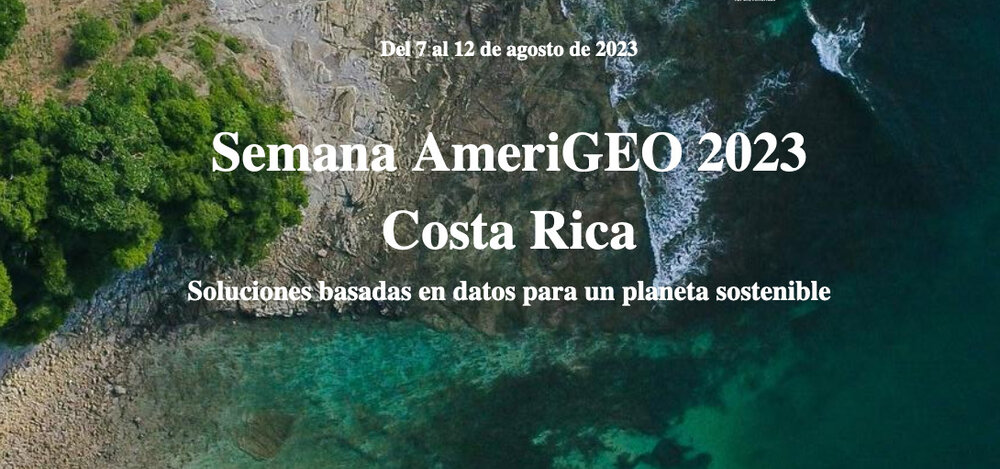Data Driven Solutions from Earth Observations in the Americas

AmeriGEO Week 2023: an opportunity to close gaps and advance together as a region.
Improvements in geospatial information, computation, and visualization technologies open up new opportunities for developing data driven solutions, to tackle our society’s most urgent challenges, including sustainable development, food security, water access, human health, climate change adaptation and mitigation, biodiversity conservation and natural disasters management. However, not every country is advancing at the same pace and gaps are widening, especially in developing countries.
AmeriGEO Week 2023, hosted by Costa Rica between August 7 and 11, will be the perfect scenario to convene the GEO Community in the Americas and discuss how to scale up the opportunities and close the gaps that are preventing countries in the region from advancing together.
Earth observations data provide near real-time information of what is happening in our territories. Developments in data interpretation technologies facilitate data analysis while reducing costs and processing time. Some of this information and tools are being shared in open and free platforms, allowing those with the knowledge to benefit for public and private objectives. Other sources of information are only available to those who have exclusive access, because they own the technologies or because they are able to pay for the licenses
Since 2014, when the Regional AmeriGEO was established under the framework of the Group of Earth Observations (GEO), countries and stakeholders from the Americas have collaborated in this coordination platform to promote the use and access of EO data and technology in the region. While some countries in the continent's north, such as Canada, Mexico, and the United States, have been regularly engaged in this process, other Latin American and Caribbean countries have been less consistent or even absent.
The gaps are frequently due to developing countries' inadequate capacity to designate staff members from competent institutions to represent their governments and participate in the international coordination with the vision and understanding to leverage the resources of GEO activities and add value, technology, and knowledge to national and local activities. Low involvement should not be misunderstood as a lack of interest in embracing and capitalizing on this technology. This condition emphasizes the scarcity of trained professionals available to manage these engagements and see the value of GEO, considering the substantial workload already being carried in their respective agencies.
Fostering higher levels of cooperation and capacity development may increase the countrie's individual technological and institutional capacity. Many of the difficulties that societies in this region face are shared, and many of the methods and analyses created under GEO activities and implemented in one country may be effectively deployed and copied in others at a significantly lower cost.
To promote participation and coordination between countries and stakeholders, the AmeriGEO community annually organizes regional events called AmeriGEO Week. Following the successful edition of AmeriGEO Week 2022 hosted by the Space Agency of Paraguay, the Ministry of Environment and Energy of Costa Rica, with the collaboration of the University of Costa Rica, the AmeriGEO Secretariat and key partners from local and international organizations, is getting ready to host #AmeriGEOWeek2023.
The theme of this year's event is "Data-driven solutions for a sustainable planet" and it will be focused on capacity building and knowledge transfer activities. The AmeriGEO community will engage in thematic sessions, trainings, and panel discussions to explore common gaps and existing solutions that leverage earth observations to address shared challenges in diverse contexts.
AmeriGEO Week 2023 will feature six targeted sessions on critical topics such as biodiversity and ecosystems, climate change adaptation, public health, disasters, water, and data access. Along with these sessions, participants can participate in over 30 parallel activities, which include lectures on the most recent advances established in the region as well as practical training workshops, that will provide attendees with applied knowledge that they may use to implement solutions in their home countries.
Participation in AmeriGEO Week 2023 is open and cost-free and will include simultaneous English-Spanish interpretation. In addition, those who do not have the opportunity to travel to the University of Costa Rica's facilities, can participate remotely in the activities that will be transmitted live through the digital platforms.
More than 500 people from 37 countries around the world have confirmed their participation in AmeriGEO Week 2023. Despite the determined efforts of AmeriGEO leaders, there are still countries in the region that are not actively participating, with the Caribbean region having the lowest levels of participation compared to Latin America and North America. Registrations are still open.
AmeriGEO Week 2023 presents a unique opportunity for the Americas to come together, share knowledge, and address common challenges in Earth observations and data-driven solutions. By collaborating and bridging gaps, this event can pave the way for a more sustainable and resilient future for the entire region. With practical training and open participation, AmeriGEO Week 2023 aims to empower countries to make the most of Earth observations and create positive change in their communities.